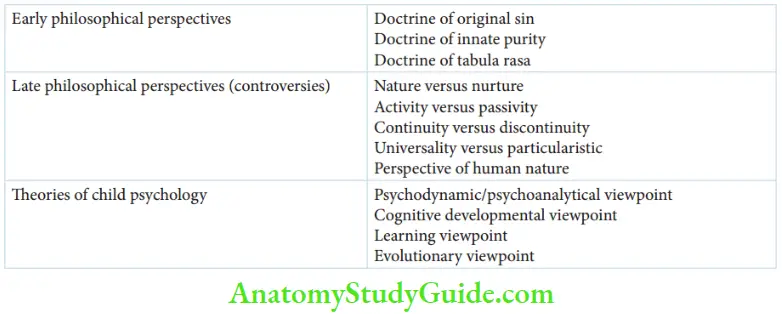Assumptions and Controversies Of Child Psychology Introduction
Child psychology is the science that deals with the mental power or interaction between the conscious and subconscious elements in a child. Scientific research on child psychology and developmental psychology began in the nineteenth century.
Table of Contents
Study on human behaviour or developmental psychology has been persistently attempted by various scientists to explore its core and develop an application-oriented approach.
Several trials, tests and hypotheses put forth by developmental psychologists have paved the way for widely accepted theories of child psychology. The founder of developmental psychology is G. Stanley Hall.
Read And Learn More: Paediatric Dentistry Notes
He performed wide research with the help of questionnaires. He called it as ‘an exploration into the contents of children’s minds’. He inferred that a child’s understanding grows rapidly and identified that ‘adolescence’ is a unique phase in the lifespan of a child.
In 1904, he wrote a book entitled ‘Adolescence’. He also performed the first large-scale investigation on youth. Hence, his immaculate contribution to this science was honoured by calling him the Father of Developmental Psychology.
Well-accepted philosophical perspectives or assumptions on child psychology existed before the advent of concrete theories.
However, philosophical perspectives were only hypotheses given by renowned developmental psychologists of the time, with no documented, academic or reproducible evidence. They were only based on keen observations or limited experimental activity.
The lack of concrete, reproducible evidence made these philosophical perspectives evolve into contemporary controversies over child psychology. Formal theories on child psychology were advocated only in the early 20th century.
The study of human behaviour has been the basis for the formulation of child psychology. Child psychology probes to understand the behaviour of an individual from an emotionally immature, reflexive infant to an adult.
An infant grows into a toddler, a pre-schooler, an industrious school goer and a mature but imbalanced adolescent before finally being addressed as an adult.
Paediatric dentistry is distinctly different from paediatric medicine as the former requires the cooperation of the child to a much higher degree for rendering dental care.
The behaviour of the child has to be understood to a greater extent and it has to be appropriately manipulated to obtain a desired outcome. Hence, a brief study of child psychology is very important to manage the child’s behaviour in a paediatric dental office.
Early Philosophical Perspectives
Developmental psychologists established three different perceptions on childhood. These perceptions had no scientific base. The believers of the perceptions carried out various experiments to understand the evolution of child behaviour and describe it further.
The perspectives described the basic character of a child at birth, or by nature, without any socioeconomic or cultural influence. The early perceptions were superseded by assumptions. Although not followed widely today, these have been incorporated into various contemporary theories established later.
The three established early perceptions were the doctrine of original sin, the doctrine of innate purity and the doctrine of tabula rasa.
- The doctrine of original sin: Th proponents believed that children have strong negative nature with a destructive outlook. They were described as born to commit mischievous activities or simply ‘born mischievous from the depth of their character and hence referred to as ‘inherently bad’.Per the doctrine, they tend to disturb almost everything possible around them to gain pleasure and are least bothered about the consequences or the pain indulged in their surroundings/society. With all these characters, they were better described as ‘selfish egoists’.The psychologists who believed in original sin thought it was the duty of society to ‘tame’ them and teach them to leave their destructive potential. With a higher influence of society, the child may become a more useful social citizen. On the contrary, the child remains bad and a selfish egoist with a lack of proper social influence. The doctrine of innate purity: Th proponents of this doctrine believed that children were ‘heavenly symbols’ or ‘descendants of the lord’ with the highest level of virgin purity in their minds and brain.
 Children were believed to have the strongest ‘positive’ nature with a constructive/protective outlook. These heavenly symbols (children) were supposed to be bestowed with ‘innate purity’. They proposed that children tend to show love and compassion towards any element in the environment and express positive companionship with any human/living/nonliving entity around them.They do not disturb anyone or anything. The pleasure of people around is more primary to them than their own. They further believed that society has the least influence on the child. The child remains good or positive with the lack of sociocultural influence. He turns disorganised with the influence of society.
Children were believed to have the strongest ‘positive’ nature with a constructive/protective outlook. These heavenly symbols (children) were supposed to be bestowed with ‘innate purity’. They proposed that children tend to show love and compassion towards any element in the environment and express positive companionship with any human/living/nonliving entity around them.They do not disturb anyone or anything. The pleasure of people around is more primary to them than their own. They further believed that society has the least influence on the child. The child remains good or positive with the lack of sociocultural influence. He turns disorganised with the influence of society. - The doctrine of tabula rasa: The proponents of this doctrine believed that the child’s mind was neither inherently bad nor pure. It is in a neutral state like a ‘blank slate’.It can receive and respond to any type of sociocultural influence. They have no inborn tendencies. A positive and productive social influence transforms the child into a useful citizen. If the environment is negative, the child transforms accordingly.

Compares the features of the early perceptions on childhood.

Late Philosophical Perspectives
As discussed earlier, the early established philosophical perspectives or assumptions led to contemporary perspectives in child psychology. These may be referred to as ‘late philosophical perspectives’.
These perspectives variably disagreed on fie important issues leading to the origin office established controversies, described as contemporary controversies.
- Nature versus nurture: This issue addresses whether the human development and evolution of character and personality are based on biological forces (nature) or environmental forces (nurture). Proponents who believed in ‘nature’ conceived that human personality evolves purely as a result of inborn tendencies and biological instincts. These are inherited from parents, irrespective of sociocultural and environmental influence. Psychologists who believed in ‘nurture’ conceived that personality evolves purely as a result of the individual interaction with the sociocultural environment and worldly experience. The human personality had little or no influence of inborn tendencies.
- Activity versus passivity: This debate focuses on expressing children as curious, active creatures (active) or passive recipients of environmental influence (passive). Psychologists who believed that children were actively conceived that human personality and character evolve as a result of the child’s persistent, deliberate encounters with his environment, in lieu of his ‘curious’ nature. Psychologists who believed in ‘passivity’ perceived that the child makes no deliberate attempt to interact with nature. The socio-cultural environment dictates and thrusts its influence on the child. The child remains a passive recipient to this influence.
- Continuity versus discontinuity: This issue discusses whether human development takes place in incremental steps (continuity) or abrupt (discontinuity) stages. Theorists who believe in ‘continuity’ explain that human mental development takes place by the process of small additions each day and cannot be expressed in distinct steps or stages. Development is gradual, which when plotted on a graph shows a smooth upward curve. Behaviour learning theories describe personality evolution as a smooth curve with no distinctive stages. Theorists who believe in ‘discontinuity’ quote that human mental development comprises spurt-growth periods with distinct steps or stages. Two spurt-growth periods are spread with a phase of latency in between. The growth plotted on a graph shows a step-ladder pattern. Psychodynamic theories consider personality evolution to occur in distinctive stages.
- Universal versus particularistic: This issue questions whether development is a normal outcome that every child is going to display (universal) or an outcome that varies from child to child (particularistic). The environment of a child comprises a microsystem (family), mesosystem (neighbourhood) and macrosystem (society)Psychologists who believed in ‘universal’ development believed that the macrosystem had a stronger influence on the child than the smaller, yet closer microsystem and mesosystem. Hence, all children of society, influenced by a common macrosystem, display almost the same behaviour and personality.On the other hand, the proponents of particularistic development believed that the microsystem has more influence on the child than the macro system. Hence, every child in a society will display distinctive behaviour in accordance to their familial influence.
- Assumption of human nature: Th early established philosophical perspectives portrayed children as either inherently bad (original sin) or inherently good (innate purity) or neither good nor bad (tabula rasa). These ideologies existed to procure a sizeable stake in the understanding of child psychology by theorists for a relatively long time. Thus, it was described as late philosophical perspective.
Theories Of Child Psychology
A theory is a set of concepts and propositions designed to organise, describe and explain an existing set of observations. The conceptual bedrock of the study of human behaviour, from which child psychology evolved, has four distinct viewpoints. There is one or more established theories following each viewpoint.
- Psychodynamic/psychoanalytical viewpoint The constituent theories are
- Psychosexual theory
- Psychosocial theory
- Hierarchy of needs
- Cognitive developmental viewpoint
- Cognitive theory
- Learning viewpoint
- Radial behaviourism
- Classical conditioning
- Operant conditioning
- Cognitive learning theory
- Evolutionary viewpoint
The first three viewpoints are discussed in brief in the forthcoming chapters of this unit. The fourth viewpoint is clinically less applicable and beyond the scope of paediatric dentistry. Hence, it has not been explained in this book.
Assumptions And Controversies Of Child Psychology Summary
- Child psychology is the science that deals with the mental power or an interaction between the conscious and subconscious elements in a child.
- The founder of developmental psychology is G. Stanley Hall.
- Description of developmental child psychology evolved from belief-based perspectives to time-tested theories:

Leave a Reply